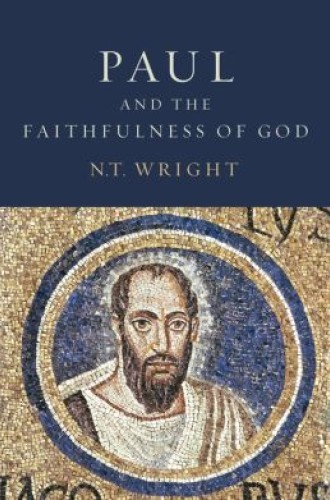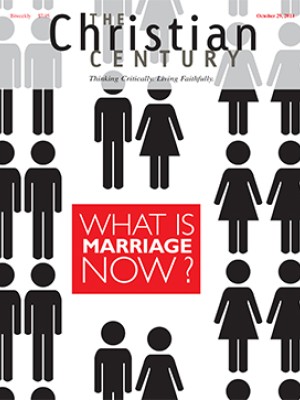Paul and the Faithfulness of God, by N. T. Wright
Studies of Paul in the past five decades reflect the tumult of the decades themselves. While Paul has ever been “protean,” as Wayne Meeks memorably put it, in the past half-century he has been subject, like other cultural icons, to vast and violent swings in public opinion, to sweeping redefinition by critics in the academy, and to both redoubled allegiance and puzzled consternation in the church.
Recast and reimagined either to correct or to bear responsibility for the sins and sorrows of civilizations, especially Christian imperialism and the rise of Christian anti-Judaism, Paul has lately been at the center of debates about the supposed parting of the ways between Jews and Christians. These debates—which are urgent and showing no signs of resolution—focus on Paul for obvious reasons: he is our earliest witness to the Jesus movement, he was himself a devout Jew, and within a decade of the death of Jesus he articulated and disseminated widely what he called the gospel, or good news, of Jesus Christ while penning letters that are our earliest reflections on the meaning of Jesus’ life, death, and resurrection.
Read our latest issue or browse back issues.
This Paul, who had once set out to eradicate what he took to be an errant movement corrupting his own tradition, became the proclaimer of the “apocalypse of Jesus Christ.” About this there is no debate. But what was Paul’s relationship to his parent tradition once he was an apostle of Jesus Christ? Or more to the point of the present volumes, what did he think and preach about the relationship between Jesus Christ and the divine covenant with Israel? Did the Christian and Jewish ways part with Paul, or did he see his message as being in continuity with—indeed, in fulfillment of—the covenant of national vocation outlined in the Hebrew scriptures? In Paul’s view, did Christians—Jews and gentiles alike—join Israel, replace Israel, or form a second elect beside Israel? Or has God created in Christ a people utterly new, radically distinct from any prior identity?
That these questions remain controversial is clear in N. T. Wright’s sprawling 1,700 pages of argument devoted to what he calls the “single great narrative” embraced by Paul. Wright, retired Anglican bishop of Durham, England, and currently research professor of New Testament and early Christianity at St. Andrews University, Scotland, finds the relevant pattern for his Jesus story outlined in Deuteronomy 27–30 (the “single flow of national narrative”), in combination with Daniel’s prophecy of Israel’s extended exile (Dan. 9).
In Wright’s telling, Israel’s exile ends neither in the restoration narrated by Ezra and Nehemiah nor in the Maccabean period, but in the advent of Jesus the Messiah, who brings about the true return of Israel and the covenant renewal spoken of in Deuteronomy 30. According to this narrative, says Wright, Paul invites first-century Jews and gentiles to understand themselves as the single family promised to Abraham, whose identity is properly understood as “Israel restored.”
Wright’s aim, simply put, is to show how Paul’s story of the crucified and risen Messiah is at the same time the story of Israel rescued from extended exile. With this long-awaited eschatological event has come, for Wright’s Paul, the restoration of the covenant, a redefinition of the elect, and consequently “restorative justice for the whole creation,” now under way in “the coming world-wide victory of the Davidic king.” Redefined around the Messiah Jesus, “the word Israel now denotes, however polemically, the entire faith-family of the Messiah”—that is, believing Jews and believing gentiles.
Spinning out this story to make it exegetically plausible requires an enormous, often ingenious effort on Wright’s part, not to mention a good bit of rearguard action throughout because this is controversial stuff. The first volume lays out Paul’s “worldview,” Wright’s preferred term for the narrative function he ascribes to the collection of texts and circumstances (scripture and Greco-Roman culture) that he pieces together as controlling data for his story. In the second volume Wright demonstrates Paul’s theological reworking of inherited covenantal themes in response to the new datum of the Messiah’s arrival.
Monotheism, election, and eschatology emerge as “freshly revealed,” “freshly reworked,” and “freshly imagined,” respectively, in an argument drawing heavily from Romans (especially chapters 3, 7, and 9–11), Galatians 3, and 1 Corinthians 15. Now the single people that is restored through Israel’s Messiah becomes the long-awaited new temple (1 Cor. 3), the place where God’s indwelling Shekinah is interchangeable with the Spirit of the Messiah. When Paul speaks of a “new creation,” according to this view, he really means the new temple, where “all nations will come to worship the God of Abraham, Isaac and Jacob,” with “songs originally sung in the shrine in Jerusalem” arising from “hearts and mouths in every nation.”
Early on Wright issues a refrain that echoes throughout the work: that the data constituting Paul’s worldview amount to “a single great narrative, not a bunch of isolated incidents treated as types, analogies, examples, models or whatever.” The opposite of this perspective, and the focus of severe critique from Wright, is “a non-narratival world where the only story is ‘my story’ on the one hand, or a narratival world where the main story is God’s invasion of the cosmos without reference to covenant, on the other.” The latter option, associated with Ernst Käsemann and J. Louis Martyn and here dubbed “neo-apocalyptic,” is, for Wright, especially irksome. Its neglect of the “single-flow narrative” is in his view at best ahistorical—a term frequently connected in the book to the Enlightenment and to American imperialism—and at worst “anti-Jewish,” a charge Wright makes explicit in the final chapter.
Wright’s single-flow story is nothing if not comprehensive. From election to eschatology, the entire story of Israel is reworked but retained in the good news of Jesus Christ. The failure of Israel to live up to the covenant is dealt with by the Messiah, who comes as the faithful Israelite to be crucified and resurrected, “to take upon himself and exhaust Israel’s curse,” to “fulfill the main plot.” Thus is God faithful to his purpose: the rescue and restoration of covenant through Israel via Israel’s Messiah.
The real question in Paul’s mind, according to Wright, is: How will God save the world? And the answer is: through the covenant with Israel. To be righteous, as Wright reads the Pauline vocabulary of justification, is to be drawn up into God’s faithfulness in this particular identity and there to participate in “a different kind of empire” on its way to “global sovereignty,” where peacemaking, humility, and restorative justice will fulfill the “real intention of Torah.” The “faithfulness of God,” for Wright’s Paul, is above all faithfulness to the Abrahamic covenant, which is at work in the ongoing flow of history as gentiles and Jews are incorporated as Messiah people and practice a new form of Torah observance in “Jewish identity, enlightened.”
General readers of Paul may not immediately grasp what is controversial in Wright’s single-narrative approach. We are accustomed, after all, to dividing the Bible into two covenants, or testaments, and to hearing these described in terms of promise and fulfillment. One might wonder why the “narrative breakers” (another name Wright gives the “neo-apocalyptic” scholars) wish to argue against the single-narrative approach. What is at stake and for whom?
From the perspective of some (myself included), the principal matter at stake is divine agency to elect freely, apart from the covenant. One need not deny the faithfulness of God to Israel to find divine agency extending beyond the covenant to incorporate non-Israel along with Israel in the new creation revealed in Jesus Christ. Indeed, at key moments Paul seems to read Israel’s scripture in the direction of inclusion of the whole creation under divine mercy, not exclusively through Israel, but in a universal gesture both including and transcending covenant identity. Although there is no question that Paul argues from scripture, many would agree with Francis Watson that “Paul shows himself to be a scriptural theologian, not a covenantal one.” That is to say, he finds in scripture the signs of divine sovereignty even over covenant.
Whereas for Wright there is nothing apocalyptic that is not also covenantal, for others (myself included), Paul’s apocalyptic vocabulary and worldview reflect shifts in perception about divine agency so powerful, so stunning that they cause him to testify that God creates ex nihilo, elects freely out of mercy and compassion, and creates a new world against every human convention of distinction and division. By this account, Paul’s realization that God’s faithfulness extends beyond the covenant with Israel to embrace the whole creation calls for the “reworked epistemology and cosmology” Wright accuses some of imposing on Paul at the expense of a thoroughgoing covenantal theology. From that point of view, Wright’s own project appears to restrict the range of divine action and divine mercy, limiting it to a controlling and singular pattern of exile and restoration that effectively precludes divine agency apart from that pattern.
Wright’s narrative demands a covenantal literalness, tied to a particular and narrowly selected set of covenant definitions, that stands opposed to Paul’s pervasive language of new creation and his location of the scandal of the cross in its demonstration of divine agency to save apart from any prerequisite, Jewish or gentile. What Wright gains, if one accepts his argument, is a kind of ecclesiological and ethical coherence: new Israel—that is, the church—is empowered only by faithful acceptance of Jesus as Messiah to move now into the restoration of justice and peace that God promised Israel, and through Israel to the nations. What is lost is ample evidence—particularly when Paul speaks of the cross, the cosmos, and ways of knowing—that Paul’s own transformation and the gospel he preached were both more radical and more far-reaching than Wright’s “freshly reworked” covenant allows.







